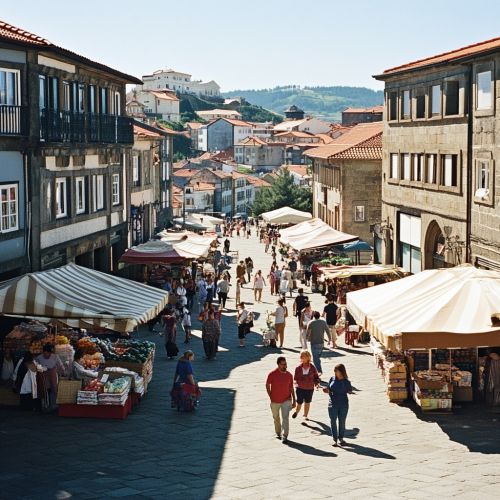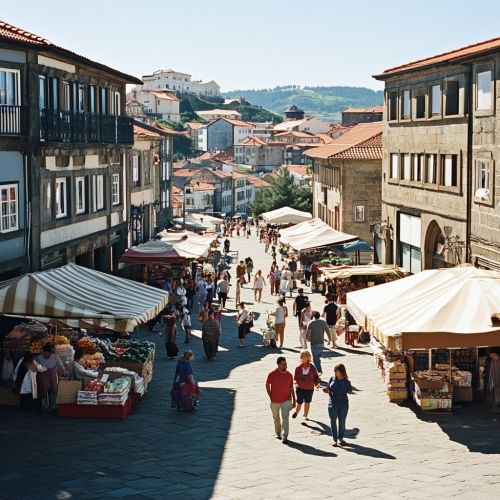Polish Social Democratic Party of Galicia
History
The Polish Social Democratic Party of Galicia (Polska Partia Socjalno-Demokratyczna Galicji, PPS-D) was a political party that operated in the region of Galicia, which was part of the Austro-Hungarian Empire, from the late 19th century until the early 20th century. The party emerged as a response to the social and economic conditions of the time, advocating for the rights of workers and the implementation of socialist principles.
The PPS-D was founded in 1890 by a group of Polish socialists who were inspired by the ideas of Marxism and the broader European socialist movement. The party aimed to address the issues faced by the working class in Galicia, including poor working conditions, low wages, and lack of political representation. The PPS-D sought to achieve these goals through both political action and grassroots organizing.
Ideology and Goals
The PPS-D was heavily influenced by Marxist theory, which emphasized the importance of class struggle and the need for a proletarian revolution to overthrow the capitalist system. The party's primary goals included the establishment of a socialist state, the nationalization of industry, and the implementation of social welfare programs to support the working class.
In addition to its socialist principles, the PPS-D also advocated for the rights of national minorities in Galicia, including Ukrainians and Jews. The party believed that the liberation of the working class could only be achieved through the unity of all oppressed groups, regardless of their ethnic or religious background.
Organizational Structure
The PPS-D was structured as a mass party, with a broad membership base that included workers, peasants, and intellectuals. The party was organized into local branches, which were responsible for recruiting new members, organizing political activities, and disseminating socialist literature. The PPS-D also had a central committee, which coordinated the party's activities and made strategic decisions.
The party's leadership included prominent socialist figures such as Ignacy Daszyński, who served as the party's first chairman, and Herman Lieberman, who played a key role in the party's legal and parliamentary activities. The PPS-D also had a strong presence in the labor movement, with many of its members being active in trade unions and workers' councils.
Political Activities
The PPS-D was actively involved in the political life of Galicia, participating in elections and organizing protests and strikes. The party's electoral strategy focused on gaining representation in the Galician Sejm (parliament) and the Austrian Reichsrat (imperial council), where it sought to advocate for workers' rights and social reforms.
In the early 20th century, the PPS-D formed alliances with other socialist and progressive parties, both within Galicia and across the Austro-Hungarian Empire. These alliances helped to strengthen the party's influence and expand its reach. The PPS-D also maintained close ties with the broader international socialist movement, participating in congresses and collaborating with socialist parties from other countries.
Challenges and Decline
Despite its successes, the PPS-D faced numerous challenges throughout its existence. The party was often subjected to repression by the Austro-Hungarian authorities, who viewed its socialist activities as a threat to the stability of the empire. Many PPS-D members were arrested, and the party's publications were frequently censored.
Internal divisions also plagued the PPS-D, with disagreements arising over strategy and ideology. Some members advocated for a more radical approach, while others favored working within the existing political system to achieve gradual reforms. These divisions ultimately weakened the party and hindered its ability to achieve its goals.
The outbreak of World War I in 1914 further exacerbated the party's difficulties. The war brought significant social and economic upheaval to Galicia, and many PPS-D members were conscripted into the military. The party struggled to maintain its activities during the war, and its influence waned as a result.
Legacy
The PPS-D played a significant role in the development of the socialist movement in Galicia and the broader Polish territories. The party's efforts to organize workers and advocate for their rights laid the groundwork for future socialist and labor movements in the region. Many of the PPS-D's leaders and members went on to play important roles in the political life of independent Poland, which was established in 1918 following the collapse of the Austro-Hungarian Empire.
The legacy of the PPS-D can also be seen in the continued influence of socialist ideas in Polish politics. The party's commitment to social justice and workers' rights remains an important part of the country's political heritage.


See Also
References
- Blobaum, Robert. "Rewolucja: Russian Poland, 1904-1907." Cornell University Press, 1995.
- Lukowski, Jerzy, and Hubert Zawadzki. "A Concise History of Poland." Cambridge University Press, 2006.
- Wandycz, Piotr S. "The Lands of Partitioned Poland, 1795-1918." University of Washington Press, 1974.
